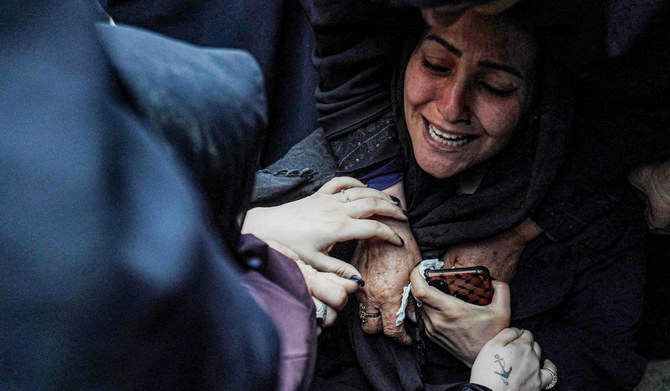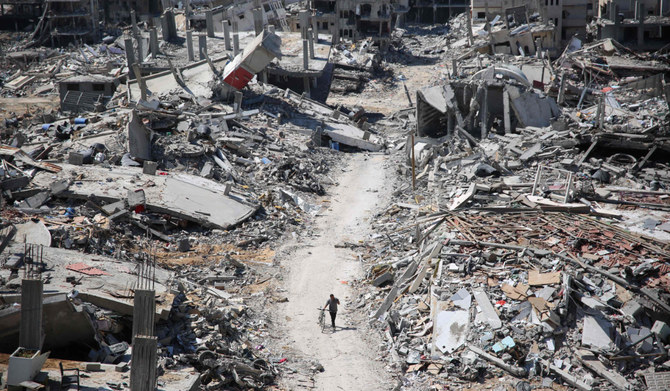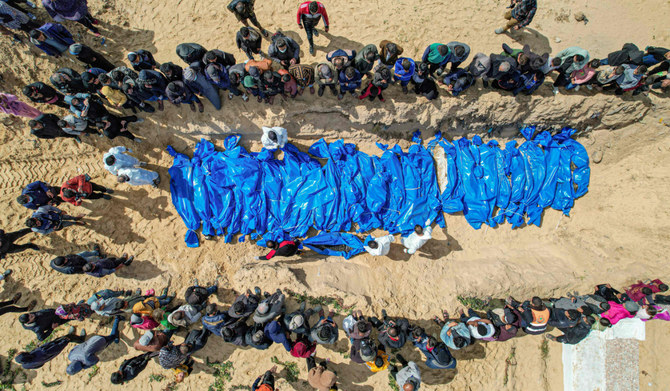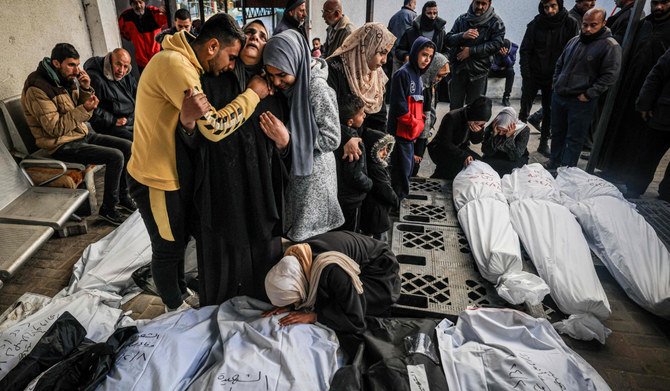JERUSALEM: Diplomatic pressure mounted Monday to avert an escalation between Iran and Israel following high-profile killings that have sent regional tensions soaring.
Israeli Prime Minister Benjamin Netanyahu said late Sunday that his country was “determined to stand against” Iran and its allied armed groups “on all fronts.”
As its war against Iran-backed Hamas in Gaza nears the 11th month, Israel has been bracing for retaliation from the Tehran-aligned “Axis of Resistance” for the killing of two senior figures.
Palestinian armed group Hamas’s political leader Ismail Haniyeh was killed in Tehran on Wednesday in an attack blamed on Israel, which has not directly commented on it.
The killing came hours after an Israeli strike on Beirut killed the military chief of Lebanon’s Hezbollah movement, Fuad Shuk.
Tehran said on Monday that “no one has the right to doubt Iran’s legal right to punish the Zionist regime” for Haniyeh’s killing.
United States President Joe Biden, whose country has sent extra warships and fighter jets to the region in support of Israel, held crisis talks on Monday with his national security team.
The head of the US military command covering the Middle East, General Michael Kurilla, arrived in Israel and met Israel’s military chief Lt. General Herzi Halevi for a security assessment, an Israeli military statement said.
Iraqi sources said a base hosting US troops in Iraq came under rocket fire on Monday, after an American strike on July 30 killed four pro-Iran Iraqi fighters.
“Rockets were launched at Ain Assad base” in Anbar province, said a military source, while a commander in a pro-Iran armed group told AFP that at least “two rockets targeted” the base, without saying who had carried out the attack.
US Secretary of State Antony Blinken on Monday urged all sides in the Middle East to avoid “escalation,” his spokesman said.
US news site Axios earlier reported that Blinken told his counterparts from the G7 nations that any attack by Iran and Hezbollah could happen as early as Monday.
A European diplomat in Tel Aviv said “a coordinated response” from Iran and its proxies was expected but de-escalation efforts persisted.
“We’re telling them they have to stop playing with fire, because the risk of flare-ups is higher than at any time since October 7,” he said, declining to be named as he was not authorized to speak on the issue.
The Jeddah-based Organization of Islamic Cooperation is to meet on Wednesday at the request of “Palestine and Iran,” to discuss developments in the region, an OIC official said.
Israeli government spokesman David Mencer said his country is “preparing for any scenario both offensively and defensively.”
In the northern port city of Haifa, shop owner Yehuda Levi, 45, told AFP that Israelis are used to conflict, but facing a multi-pronged attack “is a little tricky.”
“It’s difficult, but we believe we’re a strong country. We’re going to win this war.”
Turkiye on Monday joined multiple nations calling on their citizens to leave Lebanon, where Hezbollah is based.
Numerous airlines have suspended flights to the country or limited them to daylight hours.
Germany’s Lufthansa, which has already suspended flights to the region including Tel Aviv, said its planes would avoid Iraqi and Iranian airspace until at least Wednesday.
Royal Jordanian Airlines said it would be operating three flights this week to transport nationals out of Beirut.
The United Nations’ rights chief Volker Turk called on “all parties, along with those states with influence, to act urgently to de-escalate what has become a very precarious situation.”
Italian Foreign Minister Antonio Tajani and his Iraqi counterpart Fuad Hussein in a joint statement Monday “agreed to make every effort to avoid a regional escalation.” Italy currently holds the rotating presidency of the G7 group of countries.
French President Emmanuel Macron also appealed for “restraint” in the Middle East, during conversations with the leaders of Saudi Arabia and the United Arab Emirates.
The Israel-Hamas war in the Gaza Strip, triggered by the Palestinian group’s October 7 attack on Israel, has already drawn in Iran-backed militants in Syria, Lebanon, Iraq and Yemen.
The Hamas attack resulted in the deaths of 1,197 people, mostly civilians, according to an AFP tally based on Israeli official figures.
Militants also seized 251 hostages, 111 of whom are still held captive in Gaza, including 39 the military says are dead.
In Tel Aviv on Monday thousands of Israelis gathered to mark the fifth birthday of child hostage Ariel Bibas, and to call for the liberation of him and his family.
Netanyahu repeatedly promises to bring the hostages home but is facing a growing chorus of skeptics who worry he’s not interested in a ceasefire and hostage-release deal with Hamas, which US, Egyptian and Qatari mediators have for months been trying to reach.
“The hostages have no time and it seems like some people in Israel, including the prime minister, are taking their time,” said Gil Dickman, whose cousin Carmel Gat is among the captives.
Israel’s retaliatory military campaign in Gaza has killed at least 39,623 people, according to the Hamas-run territory’s health ministry, which does not give details of civilian and militant deaths.
As the region braced for further escalation, Hezbollah and Israel kept up their near-daily exchanges of fire.
The Lebanese health ministry said three people were killed Monday in Israeli strikes on the country’s south. Israel’s military said it had struck militants operating a drone in the Mais Al-Jabal area.
Hezbollah later said two fighters had been killed, one from Mais Al-Jabal.
Tehran has said it expects Hezbollah to hit deeper inside Israel and no longer be confined to military targets.
Far from the Lebanese border, the Israeli military said around 15 rockets had crossed from the southern Gaza Strip into Israel on Monday, with medics reporting one injury.






















